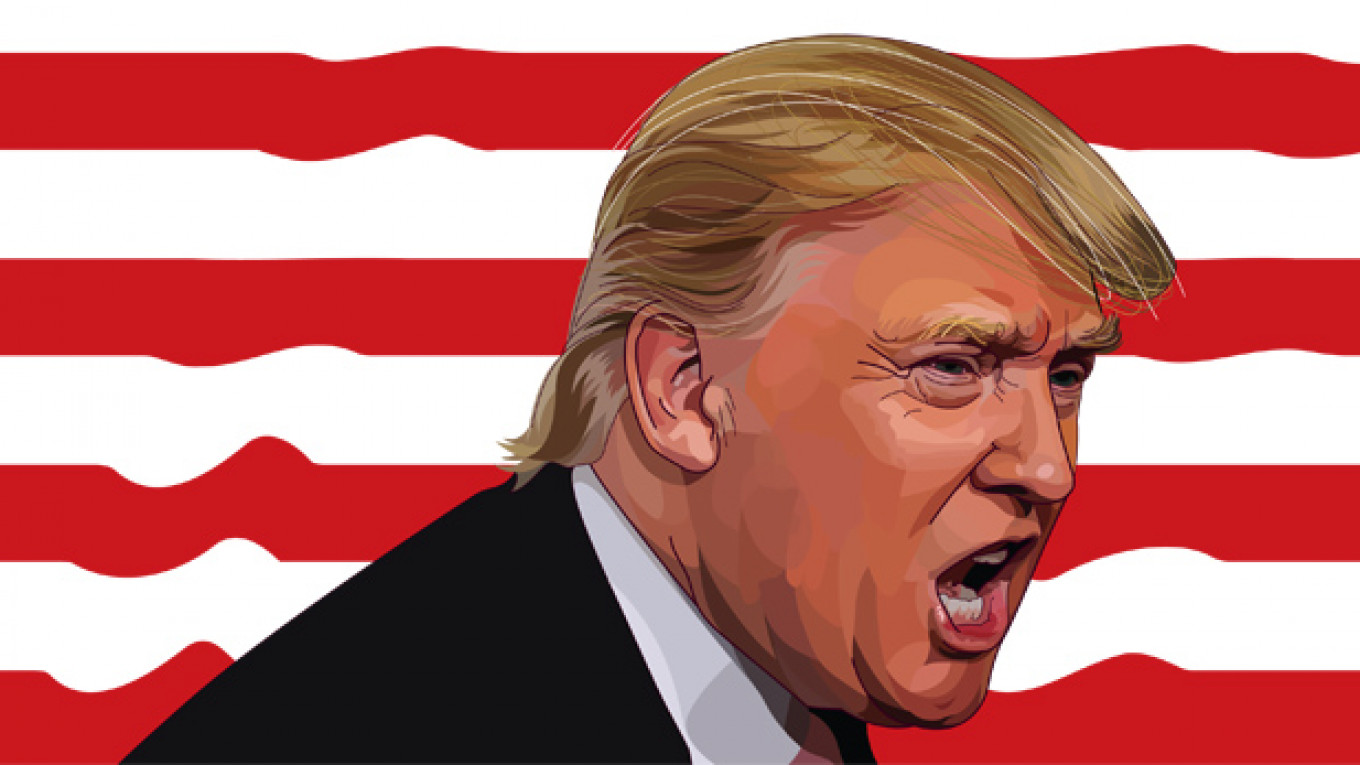
Maria Lipman
As Donald Trump has risen from a remote contender to the presumptive Republican presidential nominee, the U.S. media commentary has been an unending flow of dismay, despair, anxiety and anger. Some commentators rather desperately discussed possible ways to prevent Trump from winning the nomination, but this proved meaningless on May 3, when Trump won the Indiana primaries and his remaining competitors withdrew from the race. Now the focus of the media analysis is shifting toward "Can he win?" the presidency.
While some of those who abhor a possible Trump victory try not to give in to fear, and claim that the Democratic party is built to defeat Trump or even forecast that 2016 will be a year of "Democratic routs," others find at least several reasons why November might bring on a "Trumpocalypse."
Since hardly anyone predicted Trump's current triumph, nobody can rule out another surprise — Trump becoming president of the United States.
What does it mean for Russia? Politically, not too much. U.S. foreign policy has more constants than variables, and whoever wins the presidency will not have much freedom of maneuver ?€” he or she will have to honor the existing alliances and obligations and will be unable to ignore powerful domestic interests or dominant ideas about the U.S. preeminence in the world.
As for Russia, U.S.-Russian relations are defined, in the words of Andrej Krickovic and Yuval Weber, by a "fundamental disagreement about the genesis of the current world order." The United States regards Russia as "a revisionist power bent on overturning the established order and challenging the U.S. global leadership." While in Russia anything short of tough anti-Americanism is regarded as unacceptable concession, in the United States, a softer Russia policy is seen as inadmissible appeasement. In Russia, the United States of President Barack Obama is perceived as our main enemy, but at home Obama is often criticized for being too soft on Russia. Any future administration, Krickovic and Weber write, will face strong pressure from both political parties to harden its Russia line.
Hillary Clinton will hardly resist this pressure. Although she served as Secretary of State during the bygone era of the Obama "reset" of relations with Russia, she is anything but an appeaser. Rather, she is a hawk, not averse to using military interventions as a foreign-policy means. It is true that Trump has made occasional overtures to President Vladimir Putin, and indeed mentioned that he would improve relations with Russia ?€” "from a position of strength" ?€” which can hardly be music to Putin's ears. But one should not take these statements any more seriously than Trump's declared intention to build a wall on the U.S.-Mexican border or make U.S. allies pay for the U.S. military presence in their countries.
But if this year's presidential race in the United States does not matter too much for Russia in practical political terms, Trump's unexpected success is certainly important for us from a political-cultural standpoint.
Only eight years ago, the United States was celebrating an amazing national accomplishment: The election of an African-American for president seemed to prove that the nation ?€” if not fully, then at least in a very significant way ?€” had overcome the legacy of slavery, followed by formal and then informal racial discrimination.
Despite setbacks along the way, U.S. history could be seen as a progressive advance from Abraham Lincoln's mid-19th-century line about a "government of the people, by the people, for the people" to the abolition of the poll tax about 100 years later which finally granted voting rights to all adult citizens.
Theoretically speaking, in a universal democracy all the citizens are involved in making decisions about their country's affairs. In practice, however, decision-making is delegated to a small minority ?€” the political elite that speaks and acts on people's behalf, but does not reflect the broad diversity of voters. Campaigning, the art of attracting and accommodating various constituencies, has evolved as a highly sophisticated, complex and costly industry. It helps promising political contenders reach out to their potential supporters and persuade them that he or she is the best person to serve the public, but also marginalize unwanted influences and politically unwelcome views.
The competition between parties and candidates is fierce, and, especially in recent years, U.S. society has grown more polarized. Still, this competition has remained within the established framework of moral propriety ?€” so anybody appealing to ugly, xenophobic sentiments, whether racist, sexist, homophobic or otherwise would be defeated at early stages.
In retrospect it looks almost inevitable that one day somebody would break the unspoken ban and reach out to those constituencies which had never subscribed to the language and values of the establishment, and had been skillfully marginalized by professional campaign specialists.
This year, it happened. Donald Trump tapped into the unappealing sentiments of those who felt excluded, disenfranchised and resentful. His success is due in large part to offensive language: opting for openly nativist rhetoric, aggressively attacking "non-Americans," Mexicans, Muslims, as well as women.
In the Russia of the 1990s, when we still had competitive politics, Vladimir Zhirinovsky played a similar trick. With his unabashedly nationalistic, aggressive language he won the support of those who felt deeply disappointed and disenfranchised by the new, democratic government. On the televised election night a shocked liberal intellectual Yury Karyakin exclaimed "Russia, come to your senses! You're out of your mind!"
Despite the long history of institutionalized democracy in the United States, these days many progressive, liberal Americans seem to feel the same way as they realize that their democracy no longer has a bulwark against nativist, xenophobic politics. The Trump phenomenon makes U.S. democracy look more like that of Europe where nativist politicians have gained considerable success in recent years. It is also a disturbing realization to those Russian liberals who tend to blame ugly public sentiments and loathsome politics on state dominance and aggressive government propaganda.
Maria Lipman is e ditor-in-chief of Counterpoint journal, published by George Washington University.
A Message from The Moscow Times:
Dear readers,
We are facing unprecedented challenges. Russia's Prosecutor General's Office has designated The Moscow Times as an "undesirable" organization, criminalizing our work and putting our staff at risk of prosecution. This follows our earlier unjust labeling as a "foreign agent."
These actions are direct attempts to silence independent journalism in Russia. The authorities claim our work "discredits the decisions of the Russian leadership." We see things differently: we strive to provide accurate, unbiased reporting on Russia.
We, the journalists of The Moscow Times, refuse to be silenced. But to continue our work, we need your help.
Your support, no matter how small, makes a world of difference. If you can, please support us monthly starting from just $2. It's quick to set up, and every contribution makes a significant impact.
By supporting The Moscow Times, you're defending open, independent journalism in the face of repression. Thank you for standing with us.
Remind me later.


